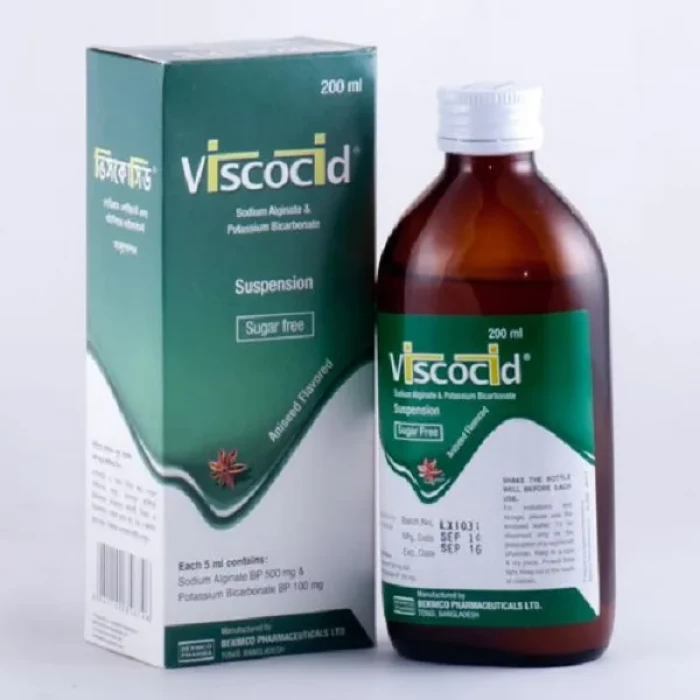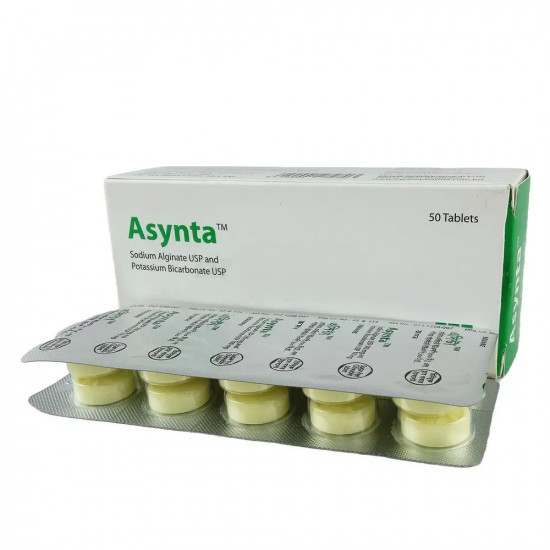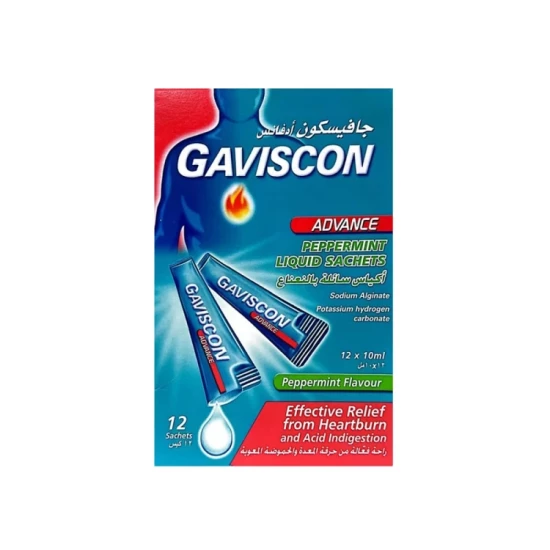
✔ 100% Authentic Product
👁️ Currently Viewing 1902
Viscocid Suspension
Potassium Bicarbonate + Sodium Alginate is used in the treatment of Heartburn and Indigestion.
Discount
Price: ৳ 150
MRP:
৳
160
6%
Off

100% Genuine Products, Guaranteed

Safe & Secure Payments, Always

Fast, Secure & Efficient Delivery

Proper Packaging
 Cash on Delivery - All over Bangladesh
Cash on Delivery - All over Bangladesh Regular Delivery - 12-24 Hours, Dhaka City* Charge Tk.39-59
Regular Delivery - 12-24 Hours, Dhaka City* Charge Tk.39-59 Regular Delivery - 24-48 Hours, Other Cities* Charge Tk.99-110
Regular Delivery - 24-48 Hours, Other Cities* Charge Tk.99-110
 ফ্রি ডেলিভারিঃ - ৯৯৯ টাকা+ অর্ডারে, ঢাকা
শহরে
ফ্রি ডেলিভারিঃ - ৯৯৯ টাকা+ অর্ডারে, ঢাকা
শহরে ফ্রি ডেলিভারিঃ - ২৯৯৯ টাকা+ অর্ডারে, ঢাকার
বাহিরে
ফ্রি ডেলিভারিঃ - ২৯৯৯ টাকা+ অর্ডারে, ঢাকার
বাহিরে
100% Genuine Products, Guaranteed
Safe & Secure Payments, Always
Fast, Secure & Efficient Delivery
Proper Packaging
 Cash on Delivery - All over Bangladesh
Cash on Delivery - All over Bangladesh Regular Delivery - 12-24 Hours, Dhaka City* Charge Tk.39-59
Regular Delivery - 12-24 Hours, Dhaka City* Charge Tk.39-59 Regular Delivery - 24-48 Hours, Other Cities* Charge Tk.99-110
Regular Delivery - 24-48 Hours, Other Cities* Charge Tk.99-110 ফ্রি ডেলিভারিঃ - ৯৯৯ টাকা+ অর্ডারে, ঢাকা
শহরে
ফ্রি ডেলিভারিঃ - ৯৯৯ টাকা+ অর্ডারে, ঢাকা
শহরে ফ্রি ডেলিভারিঃ - ২৯৯৯ টাকা+ অর্ডারে, ঢাকার
বাহিরে
ফ্রি ডেলিভারিঃ - ২৯৯৯ টাকা+ অর্ডারে, ঢাকার
বাহিরে
✅ Description:
Viscocid Suspension is a medication used to treat heartburn and indigestion. It functions by neutralizing stomach acid, promoting proper food digestion, and providing rapid relief from discomfort associated with heartburn and indigestion.
It can be taken with or without food, following the prescribed dose and duration recommended by your doctor. For children under 12 years of age, it should only be used if advised by a doctor. It's crucial to adhere to your doctor's guidance and not exceed the maximum dosage for more than 2 weeks unless directed by a healthcare professional.
When taken as directed by your doctor, Viscocid Suspension typically does not cause any side effects. However, an overdose may lead to bloating. Avoid using the maximum dosage for more than 2 weeks without your doctor's advice.
Inform your doctor about all other medications you are taking, as some may interact with Viscocid Suspension, or it may affect the effectiveness of other drugs you are using.
If you have any pre-existing medical conditions, it is important to consult your doctor before taking Viscocid Suspension. Your healthcare provider can assess whether it is safe and suitable for your specific condition.
Safety Advices

Alcohol
UNSAFE
The safety of consuming alcohol alongside this medication is not known, and your doctor can provide guidance.

Pregnancy
CONSULT YOUR DOCTOR
Viscocid Suspension is considered safe for use during pregnancy. Most studies indicate a low or negligible risk to the developing baby. However, it's always advisable to use medications during pregnancy only when prescribed by a healthcare professional.

Breastfeeding
CONSULT YOUR DOCTOR
Viscocid Suspension is generally safe to use while breastfeeding. Human studies suggest that the drug is unlikely to pass into breast milk in significant amounts and is not expected to harm the baby. Nevertheless, consult your healthcare provider before use.

Driving
SAFE
It is not known whether this medication can alter your ability to drive, so exercising caution when driving is recommended.

Kidney
CAUTION
Limited information is available regarding the use of Viscocid Suspension in patients with kidney disease. If you have kidney issues, consult your doctor before using this medication. They can assess your specific situation and provide guidance on its use.

Liver
CONSULT YOUR DOCTOR
There is limited information on the use of Viscocid Suspension in patients with liver disease.
✔️ Uses of Viscocid Suspension
- Treatment of Heartburn & Indigestion
✔️ Side Effects of Viscocid Suspension
In addition to the intended effects, some side effects may occur, including nausea, constipation, diarrhea, or headaches. If these side effects are experienced, consult a physician. In the case of an excessive dosage, there may be a sensation of swelling, in which case, consulting a physician is advisable.
✔️ Quick Suggestions:
- Refrain from taking Potassium Bicarbonate + Sodium Alginate at the same time as other medications. Antacids can interfere with the absorption of other drugs, so it's essential to space out their administration. Consult with your healthcare provider for guidance on timing if you are taking multiple medications.
- In addition to medication use, consider incorporating the following lifestyle changes to manage and prevent heartburn and indigestion:
- Eat regular meals and drink an adequate amount of water throughout the day. Staying well-hydrated and following a consistent eating schedule can help with digestion and reduce the risk of acid reflux.
- Minimize your consumption of spicy and high-fat fried foods, as they can trigger or exacerbate heartburn and indigestion.
- If you are overweight or obese, consider working towards a healthy weight. Excess weight can put pressure on the stomach, leading to reflux symptoms.
- If you are a smoker, strongly consider quitting smoking. Smoking can weaken the lower esophageal sphincter, making it easier for stomach acid to flow into the esophagus, leading to heartburn.
- Reduce your alcohol consumption, as excessive alcohol can relax the lower esophageal sphincter and contribute to acid reflux.
- After eating, avoid lying down immediately. Instead, sit or stand in a relaxed position for some time to aid digestion and reduce the likelihood of acid reflux.
- Additionally, to further manage and prevent heartburn and indigestion, consider the following dietary tips:
- Stay away from carbonated soft drinks, which can increase gastric pressure and promote acid reflux.
- Citrus fruits like oranges and lemons are acidic and can irritate the stomach, potentially increasing acid secretion. Reduce your intake of these fruits.
- Drink 6 to 8 full glasses of water daily to help prevent constipation while using this medication. Proper hydration can aid digestion and reduce the risk of indigestion.
✔️ Indications:
Viscocid is prescribed for the management of symptoms resulting from the reflux of stomach acid, bile, and pepsin into the esophagus. These symptoms include acid regurgitation, heartburn, indigestion, especially after gastric surgery, due to hiatus hernia, during pregnancy, in cases of reflux esophagitis, and associated symptoms of laryngopharyngeal reflux like hoarseness, voice disorders, sore throats, and cough. Viscocid can also be used to alleviate symptoms of gastroesophageal reflux alongside or following the discontinuation of acid-suppressing therapy.
✔️ Pharmacology
Viscocid is a combination of Sodium Alginate and Potassium Bicarbonate. Sodium Alginate is a naturally occurring substance that, when in the stomach, reacts with stomach acid to form a gel. Potassium Bicarbonate also reacts with stomach acid, creating carbon dioxide bubbles. These bubbles get trapped within the gel formed by Sodium Alginate, allowing the gel to float like a raft on top of the stomach contents. This raft acts as a barrier, preventing stomach acid from flowing back into the esophagus and thereby relieving reflux symptoms, such as heartburn. Importantly, Viscocid's mode of action is physical and does not rely on systemic absorption. The raft remains effective for up to four hours before being broken down in the digestive system and excreted in the feces.
✔️ Dosage & Administration of Viscocid Suspension
For Suspension:
- Adults and children aged 12 years and above: Take 5-10 ml (1-2 teaspoonfuls) 3-4 times daily, after meals and before bedtime.
- Children aged 2-12 years: Consume 2.5-5 ml (½-1 teaspoonful) 3-4 times daily, after meals and before bedtime.
Use in children under 2 years of age is not recommended.
No dose modifications are necessary for the elderly, individuals with hepatic impairment, or those with renal insufficiency. However, caution should be exercised in cases where a highly restricted salt diet is required.
Overdosing with this formulation is rare. In the event of an overdose, it is recommended to consult with a registered physician.
✔️ Interaction
It is advisable to maintain a time interval of at least 2 hours between taking Viscocid and other medications, particularly tetracyclines, fluoroquinolones, iron salts, thyroid hormones, chloroquine, bisphosphonates, and estramustine.
✔️ Contraindications
Sodium alginate and potassium bicarbonate should not be used in patients with known hypersensitivity to these substances.
✔️ Pregnancy & Lactation
The combination of Sodium Alginate and Potassium Bicarbonate can be used during pregnancy if clinically necessary. It has no known adverse effects on breastfed infants and can also be used during breastfeeding.
✔️ Precautions & Warnings
Sodium Alginate and Potassium Bicarbonate should be prescribed with caution in patients with renal impairment and congestive cardiac failure. Care should be taken when treating patients with hypercalcemia, nephrocalcinosis, and recurrent calcium-containing kidney stones. Reduced efficacy may be observed in patients with very low levels of gastric acid. If symptoms persist after seven days of treatment, a reevaluation of the clinical condition is warranted.
✔️ Storage Conditions
Store Viscocid below 30°C, away from light and moisture, and out of the reach of children.
⚠️Disclaimer:
At ePharma, we’re committed to providing accurate and accessible health information. However, all content is intended for informational purposes only and should not replace medical advice from a qualified physician. Please consult your healthcare provider for personalized guidance. We aim to support, not substitute, the doctor-patient relationship.








